Fora da rede significa desconectar completamente sua casa e seus eletrodomésticos da rede nacional. Se você está pensando em viver fora da rede, então você precisa saber quantos painéis solares são necessários para sair da rede. Isso depende de uma variedade de fatores, incluindo o consumo de energia da sua casa, a quantidade de luz solar que sua localização recebe, e a eficiência dos seus painéis solares.
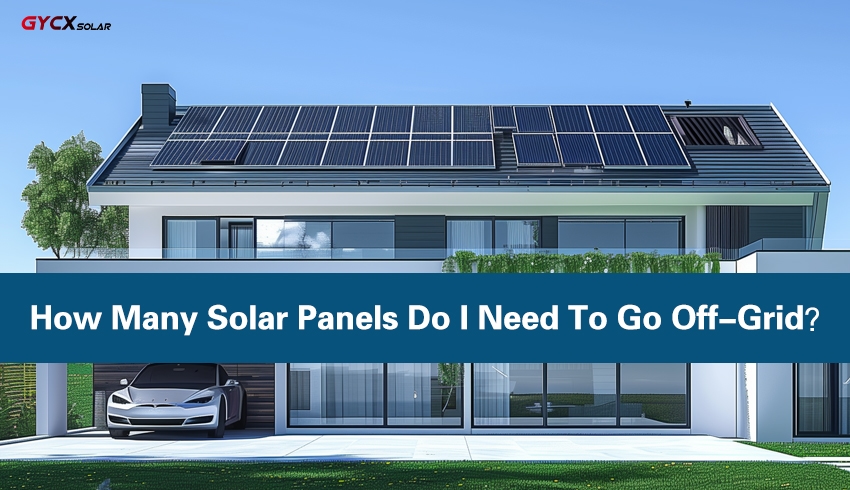
Neste artigo, exploraremos os fundamentos dos sistemas solares fora da rede para que você possa criar uma configuração que garanta confiabilidade, energia sustentável para sua casa.
Um guia para iniciantes em sistemas de energia solar fora da rede
Os sistemas de energia solar fora da rede oferecem a capacidade de gerar e armazenar eletricidade de forma independente, sem depender de uma rede externa. Geralmente consiste em um painel solar, um sistema de armazenamento de bateria, um controlador de carga e um inversor. Esses componentes trabalham juntos para capturar e converter energia solar em eletricidade utilizável, armazenando o excesso de energia para uso posterior. Funciona da seguinte maneira:
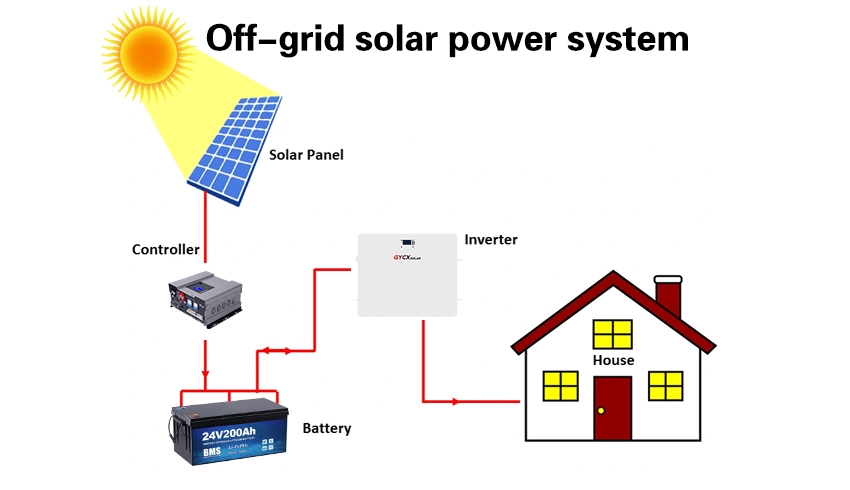
Painéis solares: Painéis solares captam a luz solar e a convertem em corrente contínua. Estes painéis são geralmente instalados em telhados ou em áreas abertas, áreas ensolaradas.
Controlador de carga: Este dispositivo é responsável por gerenciar a corrente contínua gerada pelo painel solar fotovoltaico, garantindo que a bateria possa ser carregada de forma eficiente, evitando que a bateria sobrecarregue e evitando danos à bateria.
Baterias de armazenamento de energia: As baterias contidas no sistema são usadas para armazenar energia elétrica gerada por painéis solares fotovoltaicos, que fornecem energia quando a luz solar é insuficiente.
Inversores: Como a maioria dos eletrodomésticos utiliza corrente alternada (AC), inversores convertem a corrente contínua gerada por painéis solares e baterias em corrente alternada. Torne-o compatível com eletrodomésticos.
Gestão de Energia: Os sistemas solares fora da rede exigem uma gestão cuidadosa da energia. Os usuários ou empresas precisam monitorar seu consumo e produção de energia para garantir que seu uso de energia não exceda a capacidade do sistema.
Gerador de backup (opcional) : Alguns sistemas fora da rede estão equipados com geradores de reserva para fornecer suporte de energia adicional durante períodos de pouca luz solar ou pico de demanda de energia, o que garante uma fonte de alimentação estável.
Quanta eletricidade um painel solar pode produzir?
A geração de energia do painel solar varia de acordo com o tipo e tamanho. A capacidade de geração de energia dos painéis solares é determinada pela potência nominal (potência), e maior potência significa mais potência.
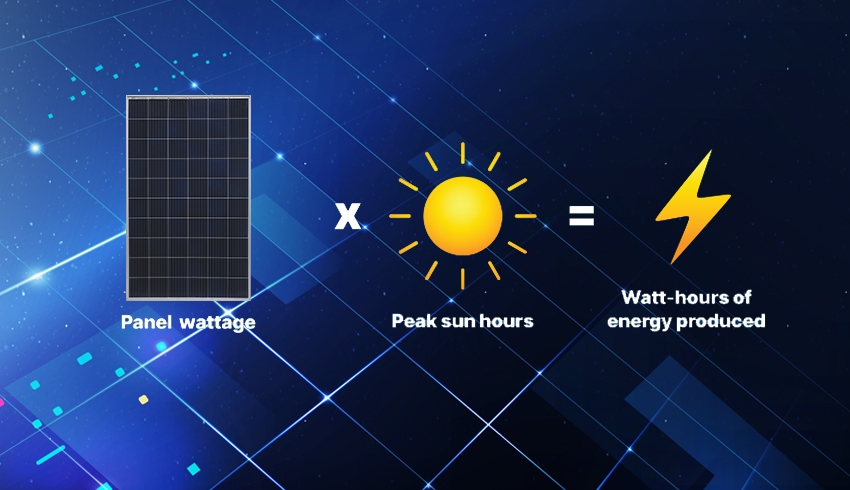
Em geral, painéis solares domésticos normalmente têm uma potência de 250 para 400 watts, dependendo do tamanho e da eficiência com que convertem energia solar em eletricidade. Embora uma classificação de potência mais alta possa parecer melhor, não é o único critério de avaliação.
Por exemplo, dois painéis, cada um com uma eficiência de 15%, pode produzir 250 watts, um 300 watts, dependendo do seu tamanho. Portanto, a eficiência é um indicador importante para medir a demanda energética dos painéis, não apenas eletricidade.
Quantos painéis solares eu preciso para sair da rede?
O número de painéis solares necessários para sair da rede depende do seu consumo diário de eletricidade, a duração média da luz do dia local, e eficiência do painel. De acordo com o AIA, a média dos EUA. uso doméstico cerca de 900 quilowatt-hora de eletricidade por mês, ou 30 quilowatt-hora por dia. Mas as casas fora da rede podem consumir menos.
Um painel solar padrão tem uma potência de cerca de 300 watts e pode gerar cerca de 1.5 quilowatts-hora de eletricidade por dia em áreas com horários de pico de luz solar de 5 horas. A fórmula para calcular o número de painéis necessários é:
Número de painéis solares = consumo diário de energia ÷ geração diária de energia por painel.
Por exemplo, se você consumir 30 KWH por dia e cada painel gera 1.5 KWH, você precisa sobre 20 painéis. No entanto, o número real pode variar dependendo da luz solar regional, e áreas com menos luz solar podem precisar de mais painéis.
Como calcular o número de painéis solares necessários
A imagem a seguir é um guia simples para ajudá-lo a calcular o número de painéis solares necessários para um sistema fora da rede.:
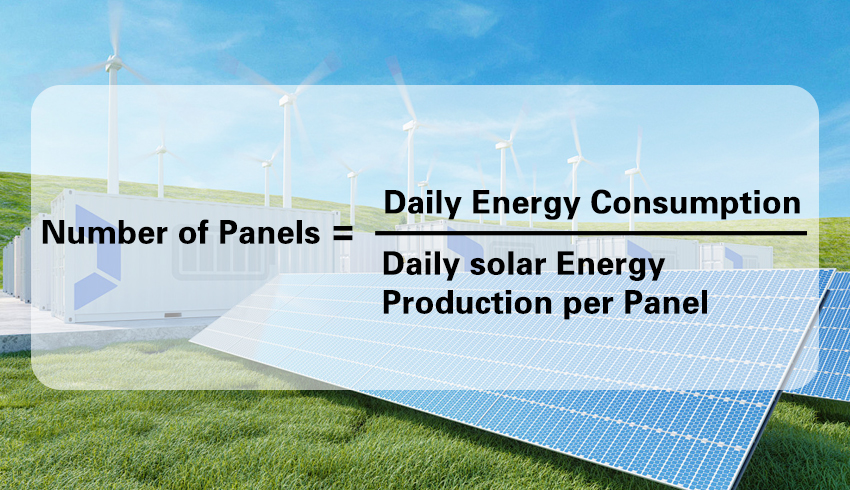
Etapa 1: Determine seu consumo diário de energia
Primeiro, você precisa descobrir quanta eletricidade sua casa consome por dia, observando sua conta de luz para determinar seu consumo total mensal de eletricidade, então dividindo por 30 para obter seu consumo diário de eletricidade (em quilowatts-hora (kWh)).
Por exemplo, se o seu consumo mensal de eletricidade for 900 kWh, então seu consumo diário é 900 KWh÷ 30 = 30 kWh.
Etapa 2: Determinar a duração do pico de luz solar local
Segundo, avalie a quantidade de pico de luz solar que sua localização recebe a cada dia. A duração máxima da luz solar é o momento em que a luz solar é forte o suficiente para que os painéis solares gerem energia máxima. Nos Estados Unidos, os horários de pico do dia geralmente variam de 3 para 6 horas por dia.
Se você mora em uma área com cinco horas de pico de sol por dia, você pode estimar que seus painéis solares são capazes de produzir cerca de cinco horas de eletricidade por dia.
Etapa 3: Avalie a eficiência do painel solar
A eficiência do painel solar é uma consideração importante. Painéis solares altamente eficientes produzem mais eletricidade do que painéis menos eficientes. Por exemplo, um painel solar de 300 watts que brilha por cinco horas quando o sol está mais forte gerará 1.5 KWH de eletricidade por dia.
Etapa 4: Calcule o número total de painéis necessários
Para determinar o número total de painéis necessários, a seguinte fórmula pode ser usada:
Consumo total de energia ÷ (duração máxima da luz solar × potência de um único painel solar) = número de painéis solares necessários
Supondo que sua casa use 30 KWH de eletricidade por dia e tem 5 horas de sol por dia, você precisaria de cerca de 20 painéis avaliados em 300 watts, calculado da seguinte forma:
(30 KWH÷ (5 horas × 300 watts) = 20 painéis).
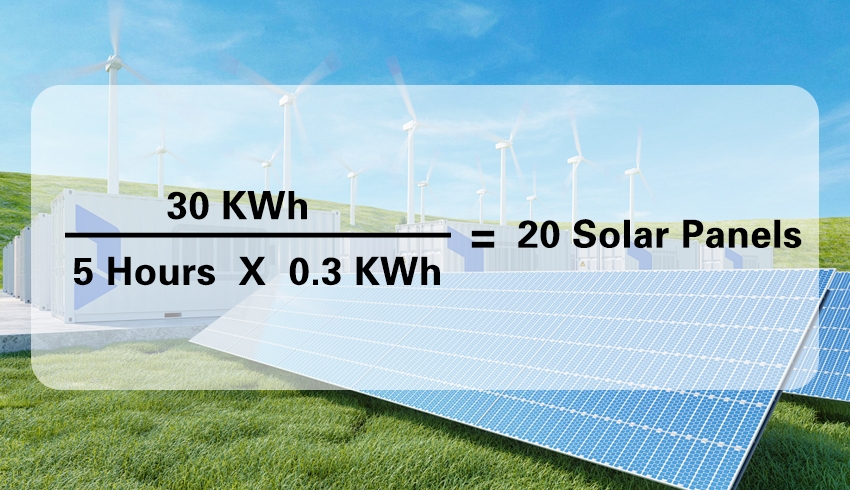
Exemplo de cálculo de sistemas de energia solar fora da rede para residências
Vejamos um caso específico:
Consumo diário de energia: 30 kWh/dia
Duração do pico de luz solar: 5 horas/dia
Energia do painel solar: 300 watts
Usando a fórmula de cálculo fornecida, podemos conseguir:
30 KWH÷ (5 × 0.3 KWH) = 20 painéis solares
Quanto custa um sistema solar fora da rede?
O preço do sistema solar fora da rede é influenciado por uma série de fatores, incluindo o tamanho do sistema, a qualidade dos painéis solares e a complexidade da instalação. Para uma casa média com consumo moderado de energia, você pode esperar gastar cerca de $25,000 para $35,000 para instalar um sistema completo. No entanto, pode custar mais para famílias com alto consumo de energia.
Custos do painel solar: Os painéis solares normalmente custam entre $2.50 e $3.50 por watt. Um sistema de painel solar de 6kW, por exemplo, custos entre $15,000 e $21,000.
Custos de armazenamento da bateria: Sistemas premium de armazenamento de bateria podem custar entre $5,000 e $15,000, dependendo da capacidade e tecnologia (como baterias de íon de lítio ou chumbo-ácido).
Inversores e controladores de carga: Eles convertem a corrente contínua gerada pelos painéis solares em corrente alternada disponível para a casa e gerenciam o fluxo de energia da bateria. Esses dois componentes podem custar entre $1,000 e $3,000 adquirir.
Custos de instalação e mão de obra: A instalação profissional e os custos de mão de obra variam dependendo da sua localização e da complexidade do seu sistema. Os custos de instalação geralmente variam de $2,000 para $10,000, dependendo do tamanho do sistema e dos custos de mão de obra.
Gerador de backup (opcional) : Muitos proprietários de residências fora da rede instalam geradores de reserva para maior segurança. Um bom gerador pode custar entre $2,000 e $5,000.
Conclusão
Se você está pensando em instalar um sistema solar fora da rede, nossa principal recomendação é encontrar uma empresa solar experiente.
No Gicx Solar, podemos ajudá-lo a entender a energia solar fora da rede e projetar o sistema certo para suas necessidades. Analise o custo do sistema para ajudá-lo a pesar os prós e os contras e tomar a melhor decisão para sua família.
Nossa equipe é apaixonada por energia solar e acredita que ela pode melhorar vidas. Se você tiver alguma dúvida sobre energia solar fora da rede, entre em contato conosco e ficaremos felizes em ajudá-lo.
Perguntas frequentes
Qual o tamanho de um sistema solar necessário para ficar fora da rede?
Para sair da rede, você vai precisar de um 5 kW para 10 sistema solar kW, dependendo de suas necessidades de energia e localização.
Quantos quilowatts-hora eu preciso para sair da rede?
O número de quilowatts-hora necessários para sair da rede depende do tamanho da casa e do uso de energia. As necessidades médias das famílias 10-30 KWH por dia para manter a vida fora da rede. A estimativa depende de fatores como eletrodomésticos, eficiência climática e energética.
Posso viver inteiramente com energia solar?
Sim, você pode usar painéis solares para viver completamente fora da rede. Mas planejar a capacidade do painel solar, armazenamento de bateria e gerenciamento de energia são necessários, sujeito à localização, consumo de energia e mudanças sazonais na luz solar.
